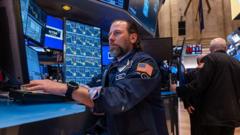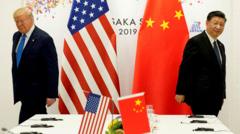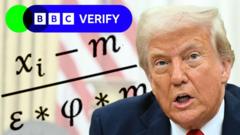The aftermath of new tariffs imposed by the Trump administration has led to a violent market downturn, as nations brace for economic repercussions.
**Global Markets Face Turmoil as China Retaliates Against Trump’s Tariffs**

**Global Markets Face Turmoil as China Retaliates Against Trump’s Tariffs**
International stock markets plunge as China responds with tariffs, signaling a potential trade war escalation.
Stock market chaos erupted on Friday following China's retaliatory measures against tariffs introduced by Donald Trump, raising fears of a protracted trade war and its consequences on the global economy. All three key US stock indexes witnessed declines exceeding 5%, with the S&P 500 plummeting nearly 6%, marking the most tumultuous week for US markets since 2020.
In the UK, the FTSE 100 nosedived by almost 5%, its steepest decline in five years, while declines were mirrored across Asian markets and major exchanges in Germany and France. Despite the market turmoil, Trump remained defiant, shrugging off investor concerns and asserting the strength of the US labor market. In a message to his followers, he proclaimed, “Hang tough. We can’t lose.”
Since Trump’s announcement of a sweeping 10% import tax on goods from all nations—including crucial trading allies like China and the European Union—global markets have absorbed trillions in losses. Analysts suggest that this represents the most significant tax hike in the US since 1968, with predictions of a slowdown in trade and potential recessions in numerous countries.
On Friday, China retaliated against the tariffs by imposing a 34% tax on US goods, restricting key mineral exports, and adding American firms to its trade blacklist, condemning Trump's actions as “bullying.” Other nations, including the EU, are attempting to negotiate while signaling a preparedness to defend their interests, with trade commissioner Maroš Šefčovič emphasizing the need for a fresh approach.
Trump's tariff initiatives align with promises made during his campaign, but their expansive scope caught many analysts off guard, leading to one of the most severe stock decline phases since early 2020, during the Covid-19 outbreak. The market sell-off began with major corporations like Apple and Nike, heavily reliant on Asian supply chains, but quickly spread to sectors traditionally unaffected by tariffs, such as consumer goods, healthcare, and utilities.
The climate in the investment community is notably grim, with experts like Mike Dickson of Horizon Investments voicing that the full impact of the tariffs will unfold over time. Meanwhile, JP Morgan raised the probability of a global economic recession this year from 40% to 60%, citing that the tariffs might slash US growth by two percentage points.
While some investors viewed the market pullback as a natural correction following an extraordinary surge, others underlined the serious implications of the trade measures. Jerome Powell, head of the US Federal Reserve, indicated that while the economy appears sturdy, uncertainties loom large. As companies like Nike experienced a slight recovery, other sectors continued to flounder, with Apple shares plummeting over 7%—a nearly 15% drop since Wednesday’s announcement.
The storm was global, impacting the UK’s FTSE 100, which recorded a 4.9% decline—the largest one-day drop since March 2020, along with significant losses on European markets. Japan’s Nikkei 225 index fell more than 2.7%, as Prime Minister termed the scenario a "national crisis."
Simultaneously, some of Trump's allies have begun to voice concerns over the potential fallout of these tariffs. Senator Ted Cruz from Texas cautioned that such actions could lead to detrimental outcomes if prolonged tariffs are sustained internationally.
As the impacts of these measures ripple through various sectors, stakeholders from agriculture to international fishing face worries over escalating costs and market stability, as flagged by farmers in Kansas and fishing leaders in the Falkland Islands.
The situation continues to evolve as economies worldwide monitor the fallout from these tariffs, with far-reaching implications estimated for the immediate future.
In the UK, the FTSE 100 nosedived by almost 5%, its steepest decline in five years, while declines were mirrored across Asian markets and major exchanges in Germany and France. Despite the market turmoil, Trump remained defiant, shrugging off investor concerns and asserting the strength of the US labor market. In a message to his followers, he proclaimed, “Hang tough. We can’t lose.”
Since Trump’s announcement of a sweeping 10% import tax on goods from all nations—including crucial trading allies like China and the European Union—global markets have absorbed trillions in losses. Analysts suggest that this represents the most significant tax hike in the US since 1968, with predictions of a slowdown in trade and potential recessions in numerous countries.
On Friday, China retaliated against the tariffs by imposing a 34% tax on US goods, restricting key mineral exports, and adding American firms to its trade blacklist, condemning Trump's actions as “bullying.” Other nations, including the EU, are attempting to negotiate while signaling a preparedness to defend their interests, with trade commissioner Maroš Šefčovič emphasizing the need for a fresh approach.
Trump's tariff initiatives align with promises made during his campaign, but their expansive scope caught many analysts off guard, leading to one of the most severe stock decline phases since early 2020, during the Covid-19 outbreak. The market sell-off began with major corporations like Apple and Nike, heavily reliant on Asian supply chains, but quickly spread to sectors traditionally unaffected by tariffs, such as consumer goods, healthcare, and utilities.
The climate in the investment community is notably grim, with experts like Mike Dickson of Horizon Investments voicing that the full impact of the tariffs will unfold over time. Meanwhile, JP Morgan raised the probability of a global economic recession this year from 40% to 60%, citing that the tariffs might slash US growth by two percentage points.
While some investors viewed the market pullback as a natural correction following an extraordinary surge, others underlined the serious implications of the trade measures. Jerome Powell, head of the US Federal Reserve, indicated that while the economy appears sturdy, uncertainties loom large. As companies like Nike experienced a slight recovery, other sectors continued to flounder, with Apple shares plummeting over 7%—a nearly 15% drop since Wednesday’s announcement.
The storm was global, impacting the UK’s FTSE 100, which recorded a 4.9% decline—the largest one-day drop since March 2020, along with significant losses on European markets. Japan’s Nikkei 225 index fell more than 2.7%, as Prime Minister termed the scenario a "national crisis."
Simultaneously, some of Trump's allies have begun to voice concerns over the potential fallout of these tariffs. Senator Ted Cruz from Texas cautioned that such actions could lead to detrimental outcomes if prolonged tariffs are sustained internationally.
As the impacts of these measures ripple through various sectors, stakeholders from agriculture to international fishing face worries over escalating costs and market stability, as flagged by farmers in Kansas and fishing leaders in the Falkland Islands.
The situation continues to evolve as economies worldwide monitor the fallout from these tariffs, with far-reaching implications estimated for the immediate future.





















